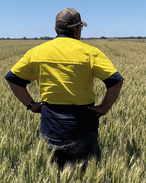This article is 4 years old. Images might not display.
Deputy Premier and Minister for Regional NSW, John Barilaro, said renewing current support measures will provide drought-affected communities across regional NSW with the certainty they need to make important stock and business decisions.
"I'm all too aware that some of our hardest hit communities feel like they have been forgotten due to the bushfires and COVID-19, and that rain in recent months may have left some people in the city with the impression that the drought is over," Minister Barilaro said.
"My message to farmers and regional communities still battling this drought is that you are not alone.
"That is why we are continuing financial relief for farmers in drought by waiving onerous fees and charges and expanding measures to turbo-charge recovery.
"We have seen good rainfall across the state in recent months but we need to make sure the dollars continue to flow to keep our farmers and regional communities going."
Extended support for drought-affected communities and farmers include:
- $28.5 million to continue existing water licence fee waivers for stock, domestic, general and high security water users
- $116 million to continue the Drought Transport subsidy
- $99 million to continue waiving of Local Land Services rates, bee site permits, Western Lands lease rent, wild dog fence rates and provide assistance for vehicle registration costs for eligible primary producers
- Continuation of health and wellbeing programs, including the Farmgate Counsellors program, Aboriginal wellbeing services and Royal Flying Doctors Far West Drought Support programs
Minister for Agriculture Adam Marshall said the Drought Transport Subsidy would be extended, to help farmers reduce the cost of transporting fodder, stock, fertiliser, water and other farm inputs.
"We are reducing the cost of doing business to help farmers and their stock endure as we head towards recovery," Marshall said.
Minister for Mental Health Bronnie Taylor said as a regionally based Minister she is acutely aware of the toll the drought, bushfires and COVID-19 has had on rural communities.
"We've had great success with measures like the Farmgate Counsellors program, and it is fantastic that this boost to drought assistance has a continued focus on mental health.
"As part of these extended programs, people will continue to receive the help and support they need to address significant health issues such as depression, anxiety, substance abuse, panic attacks, suicide prevention, trauma and grief."
Primary producers and small businesses already receiving support payments, subsidies, waivers and fee relief from the Emergency Drought Relief Package do not have to reapply.
This funding brings the NSW Government's total drought support and water security commitment to close to $4 billion.






















